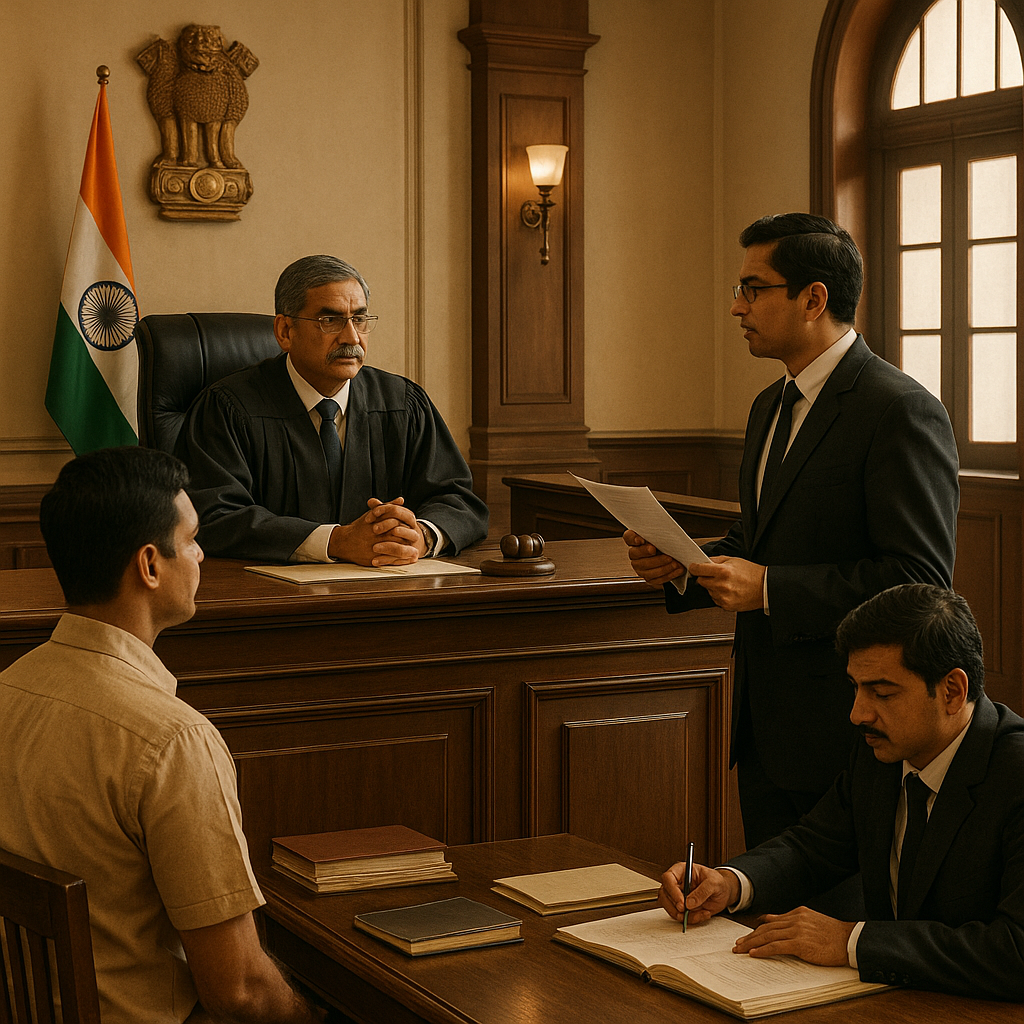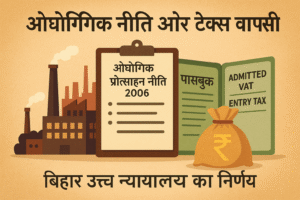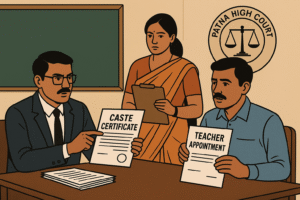The Patna High Court, by an oral judgment dated 04 February 2021, disposed of a batch of writ petitions challenging decisions of the Bihar Medical Services and Infrastructure Corporation Ltd. (BMSICL) to cancel hospital-construction tenders on the ground that only one bidder had participated. The Court held that when a technically responsive bid emerges in what is effectively a “second” tender process, the authority (here, the BMSICL Board) must record at least brief, precise reasons before deciding to cancel and re-tender. In the facts of these cases, the Court did not quash the cancellations but remanded the matters to the Board to re-examine the petitioners’ bids and issue a reasoned decision within 15 days of receiving the Court’s order.
Simplified Explanation of the Judgment (700–900 words)
This case concerns how government agencies in Bihar should handle procurement when only one bidder turns up. Several contractors (petitioners) challenged BMSICL’s decision to cancel their tenders and issue fresh notices solely because each tender attracted a “single bidder,” even though the technical committee had already found their technical bids to be responsive. These tenders related to construction of government hospitals, a project category with obvious public importance. All petitions were heard together and disposed of by a common judgment.
The core dispute turned on whether the tender in question should be treated as a “first tender” or a “second tender.” This distinction mattered because the applicable procurement clause (referred to in the case papers) permits an authority to cancel a “first tender” that yields only a single bid, without needing to assign detailed reasons. However, if the tender is actually the “second tender” (i.e., a re-tender after the first attempt failed), and the sole bidder is technically qualified, then the authority must record reasons before discarding that bid and going for another re-tender.
On the facts, the State argued that the very first tender process had produced no bids at all, so the next tender should be treated as the “first tender” for all practical purposes. Therefore, when that tender yielded a solitary bid, the Board could cancel and re-tender without further explanation. The petitioners countered that, in their cases, the cancellations happened in what was effectively the “second tender,” after an earlier tender had already been rejected or had failed; hence reasons were mandatory once the technical committee declared their bids responsive.
The Court examined the record and clarified the legal position:
• If a “fresh” or first-time tender results in only one bid, the mere fact of a solitary bidder can justify re-tendering; no separate reasons are required beyond the “single bid” rationale.
• However, if the tender under consideration is, in substance, the “second tender,” and the sole bidder’s technical bid is responsive, the Board cannot simply say “only one bid” and cancel. In such a situation, the Board must give at least a brief and precise reason for rejecting a technically responsive single bid before deciding to re-tender.
Applying this framework, the Court found that the Board had not discharged its obligation to give reasons in those cases where the tender was effectively a second round and the technical committee had already found the bid responsive. The Board had recorded no reason other than “single bidder,” which, the Court clarified, is a valid justification only in the context of a first tender. Because this error went to the decision-making process, the Court opted not to substitute its own view on the merits. Instead, it remitted the matters to the BMSICL Board for fresh consideration, directing the Board to objectively evaluate the bids and to provide reasons if it still decided to reject them.
Importantly, the Court emphasized two guardrails:
- Public interest in hospital construction: While judicial review in tender matters is limited and courts are generally slow to interfere in policy and commercial decisions involving public projects, the Court can—indeed must—interfere where the decision-making process is arbitrary or where mandatory procedural safeguards (like the duty to record reasons) are ignored.
- No direction to award: The Court made it clear that remanding the matter was not a direction to accept the petitioners’ bids. The Board remains free to take any decision afresh, including rejection, provided it gives concise, cogent reasons in accordance with the applicable clause and the Court’s guidance. The Court fixed a 15-day timeline from the date of receipt/production of the order for the Board to issue its fresh, reasoned decision.
In sum, the High Court drew a clear procedural line: the “single bidder” ground suffices to cancel a first-attempt tender, but not a second-attempt tender once a bid is found technically responsive. In the latter scenario, the procuring entity must write down at least short reasons for not accepting the bid. Because this step was missing here, the cancellations could not stand as-is. The cases were therefore remanded for a reasoned reconsideration within 15 days, without any mandate to accept or reject the bids.
Significance or Implication of the Judgment
• For government and PSUs in Bihar: The decision clarifies that in re-tender situations, authorities cannot rely on a blanket “single bidder” formula once technical responsiveness is established. They must apply mind and record brief reasons before rejecting a lone, responsive bid. This promotes transparency and reduces arbitrary cancellations that delay public projects.
• For contractors and vendors: Where a re-tender yields only one technically responsive bid, the procuring entity must justify any rejection with concise reasoning. This protects bidders from opaque decision-making and encourages participation by assuring fair process oversight.
• For the public: Timely infrastructure (here, hospitals) depends on accountable procurement. Reasoned decisions help curb delays and ensure that cancellation and re-tendering are not used mechanically, thereby serving public interest more efficiently.
Legal Issue(s) Decided and the Court’s Decision (with reasoning)
• Whether a tender can be cancelled solely for being a “single bidder” tender when it is effectively the second round and the sole bidder is technically responsive.
— Decision: No. In a second-round tender, once the bid is technically responsive, the authority must give at least a brief, precise reason before cancelling and re-tendering. A bare “single bidder” note is inadequate.
• Scope of judicial review in public procurement involving hospital construction.
— Decision: Limited. Courts generally refrain from interfering in tender policy and commercial decisions unless the action is arbitrary or the decision-making process is flawed. Here, interference was warranted because the Board failed to record reasons in cases where reasons were required. Remedy: remand for a reasoned decision within 15 days.
• Appropriate relief.
— Decision: The Court did not quash the cancellations outright or direct award. Instead, it remanded the matters to the Board to re-examine and issue a fresh, reasoned decision, clarifying that the earlier Board decision will not stand in the way of fresh consideration.
Judgments Referred by Parties (with citations)
• State of Jharkhand v. CWE-SOMA Consortium, (2016) 14 SCC 172 — cited to emphasize limited judicial review in tender matters and the primacy of public interest in infrastructure projects. (Referred during arguments; the High Court nonetheless insisted on procedural fairness via recorded reasons.)
Judgments Relied Upon or Cited by Court (with citations)
• None specifically beyond general principles referenced; the Court principally applied the duty-to-give-reasons requirement arising from the tender clause and the fresh-tender/second-tender distinction on the facts.
Case Title
Batch matters under Article 226 challenging BMSICL tender cancellations on “single bidder” ground (names withheld; referred to as petitioners vs. State of Bihar & Ors., including BMSICL).
Case Number
• CWJC No. 7166 of 2020 (lead)
• CWJC No. 7846 of 2020
• CWJC No. 7856 of 2020
• CWJC No. 7921 of 2020
Citation(s)
2021(1)PLJR 735
Coram and Names of Judges
• Hon’ble Mr. Justice Anil Kumar Upadhyay (Oral Judgment dated 04-02-2021).
Names of Advocates and who they appeared for
• For the petitioners (across the batch): Mr. Shashi Bhushan Kumar Manglam, Advocate.
• For the State/Respondents: Mr. Lalit Kishore, Advocate General; Mr. S.D. Yadav, AAG 9; Mr. Braj Bhushan Mishra, AC to AAG 9.
• For BMSICL: Mr. Vikash Kumar, Advocate.
Link to Judgment
MTUjNzE2NiMyMDIwIzEjTg==-YH7D5BBmDFs=
If you found this explanation helpful and wish to stay informed about how legal developments may affect your rights in Bihar, you may consider following Samvida Law Associates for more updates.








